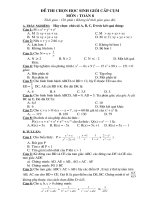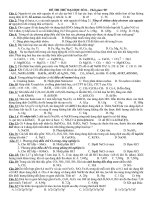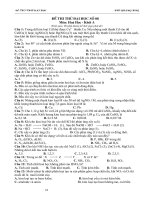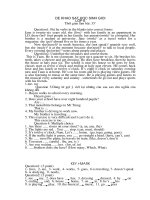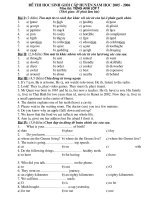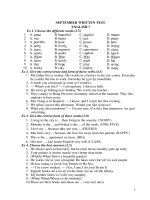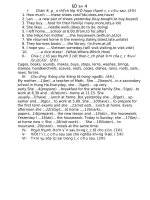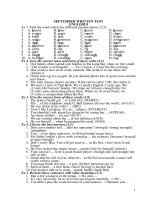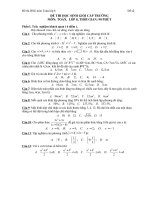DE THI HSG SO 8
Bạn đang xem bản rút gọn của tài liệu. Xem và tải ngay bản đầy đủ của tài liệu tại đây (117.58 KB, 5 trang )
<span class='text_page_counter'>(1)</span><div class='page_container' data-page=1>
<b>PHÒNG GIÁO DỤC VÀ ĐÀO TẠO</b>
<b>HUYỆN BÙ GIA MẬP</b>
<b>TRƯỜNG THCS BÙ NHO</b>
<b>ĐỀ THI SỐ 8</b>
<b>ĐỀ THI TỰ LUYỆN VÀO LỚP 10 THPT CHUYÊN LỚP 9</b>
<b>NĂM HỌC : 2010 – 2011</b>
Khóa ngày : ________2011
MƠN: TIẾNG ANH
Thời gian làm bài: 120 phút (Không kể thời gian phát đề)
(Thi sinh làm bài trên đề thi :đề thi có 6 trang)
<b>I. Choose the word whose underlined part is pronounced differently.</b>
1. A. pronounce B. other C. won D. ton
2. A. guilty B. suitcase C. suitable D. recruit
3. A naked B. needed C. sacred D. served
4. A. headache B. flame C. shame D. shadow
5. A. coughs B. hopes C. thoughts D. ploughs
<b>II. Choose the word whose stress is pronounced differently.</b>
6. A. military B. accurate C. preferential D. delicate
7. A. human B. treatment C. miracle D. disease
8. A. occasion B. discover C. industry D. arrange
9. A. revolution B. independence C. associate D. operation
10. A. technology B. educational C. accessible D. miraculous
<b>III. Choose the correct word or phrase to complete the sentence.</b>
11. The child was told to eat all his vegetables or _______ he would get no ice-cream.
A. else B. instead C. in fact D. in case
12. His new appointment takes _______ from the beginning of next month.
A. place B. effect C. post D. possession
13. There was no _______ in waiting longer than half an hour so we left.
A. good B. point C. worth D. use
14. I _______ to other people borrowing my books: they always forget to return them.
A. disagree B. avoid C. dislike D. object
15. The discovery was a major _______ for research workers
A. break-in B. break-out C. break-through D. break-down
16. _______ known as “Stonehenge” has never been determined.
A. That the stone circle B. The stone circle
C. There is the stone circle D. Who built the stone circle
17. I hope we will be able to avoid _______ anyone
A. disappointment B disappointing C. disappointed D. disappoint
18. Ben was stopped by a police officer last night. He must _______ too fast.
A. drive B. be driving C. has driven D. have driven
19. I failed the physics exam because it was _______ difficult for me.
A. too B. such C. very D. very much
20. There were over 30,000_______ at the football match.
A. spectators B. viewers C. witnesses D. watchers
21. I suggest we _______ outside the English speaking club tomorrow at 8.30
A. meeting B. meet C. met D. will meet
22. _______ next Sunday.
A. I would rather you had come B. I would rather you have come
C. I would rather you came D. should rather you came
23. The rise in house prices _______ him to sell his house for a large profit.
A. managed B. succeeded C. enabled D. achieved
24. I will show you around the city when you _______ to visit me.
</div>
<span class='text_page_counter'>(2)</span><div class='page_container' data-page=2>
A. as B. that C. when D. than
<b>IV. In most lines of the text, there is one unnecessary word. It is either grammatically incorrect or</b>
<b>does not fit in with the sense of the test. Underline this word and write the correction, or put a tick</b>
<b>() in the gap if a line is correct.</b>
<b> COMMUNICATION</b>
Managers spend most of their time communicating-reading, and writing <b>0.… and……..</b>
talking or listening - yet the evidence is that they do not always do this <b>00 ……. …</b>
as successfully. One reason that has been suggested for this is that, in the 26. ...…...
past, communication was regarded as a natural process, not been taught 27. ...……
in any formal sense. This theory has been changing, and with the concept 28. ...……
of communication as an “art” now appears regularly in the management 29. ...……
courses and seminars. Communication is probably only one of the least 30. ...…….
appreciated aspects of management, and more and more organizations are 31. ...…...
realizing that effective communication involves telling staff why all things 32. ...…....
are happening. This not only helps day-to-day working but allows changes 33. ...…....
to be introduced more smoothly, and sometimes leads to improvements for 34. ...…....
being mentioned by staff. Both the morale and efficiency of an organization 35. ...
are depend to a great extent on the abilities of its staff to communicate 36. ...……
effectively. Communication is not something that should be undertaken 37. ...
only when trouble occurs. It should be a daily habit if the organization is 38. ...…....
to run smoothly and avoid difficulties and, of course, it should be both a 39. ...……
two-way process, involving listening to as well as talking. Regular 40. ...……
exchanges of ideas between managers and staff will help to create good teamwork
<b>V. Read the text below. Use the word given in capitals at the end of each line to form a word that fits</b>
<b>in the space in the same line.</b>
<b>FIVE WAYS TO IMPROVE YOUR MEMORY</b>
* Pay better attention at the time. Rehearse the information (41)... . IMMEDIATE
afterwards, allowing (42)... longer gaps between each INCREASE
(43) ... Thus, when you hear a name, say it to yourself, then say it REPEAT
again a minute later, and so on.
* Tax your brain in a (44) ... of ways. One researcher found that VARY
rats (45)... interesting things to do had better memories than bored rats GIVE
* Attach meaning to memory - the more (46) ... an event is, the better SIGNIFY
it will be remembered.
* Attach what you want to remember to something already familiar
to you. Let’s say you need to remember ten words; start by (47) ... MEMORY
things that are well-known to you (48) ... , such as objects in your PERSON
house, then associate one of the words with each.
*Have(49)... in your ability to remember things around you. CONFIDE
Don’t (50) ... your brain. ESTIMATE
<b>VI. Read the passage and fill in each gap with ONE suitable word.</b>
</div>
<span class='text_page_counter'>(3)</span><div class='page_container' data-page=3>
<b>VII. Complete the letter by writing ONE suitable verb in each space. A contraction (don’t) counts as </b>
<b>one word.</b>
<b> Dear Tom,</b>
Well, this time next week you’ll be somewhere in Europe on a train. I’m sure any mum would
(67)...! Actually, you’re very lucky. I’d love to be able to go off around the world. I often wish I
(68) ... traveled more when I was younger. I really hope you (69)... yourself, but do
be careful, won’t you? You’re only 18 after all. Do take care with your money, won’t you? And I’d rather
you (70)...spend too many nights in your tent alone. It’s so dangerous. I suggest you only
(71)... your tent in a proper campsite.
I wish you(72) ... going quite so soon. It’s a pity you (73)... stay until after
Dad’s 50th<sub> birthday. But never mind. I wish Dad (74)...be at the airport to see you off, but he’s</sub>
got some really important business that day.
Suppose we (75)... out to see you in June. Just a thought. Anyway, just remember, if you
get into any trouble, we’re only a phone call anyway, and come what may , we’ll always be there for you.
Love, Mum
<b>VIII. Read the following passage and answer the questions that follow by circling A, B, C, D to</b>
<b>indicate your answer.</b>
<b>CONSERVING THE WORLD’S NATURAL RESOURCES</b>
In the decade of the 1970s, the United Nations organized several important meeting on the human
environment to study a very serious problem. We humans are destroying the world around us. We are
using up all of our natural resources. We must learn to conserve them, or life will be very bad for our
children and our grandchildren.
There are several major parts to this problem.
<b>1. Population. Most problems of the environment come from population growth. In 1700 there were</b>
1.6 billion, in 1950 2.5 billion, and in 1980 4.4 billion. In the year 2000 there will be 6.3 billion.
More people need more water, more food, more wood, and more petroleum.
<b>2. Distribution. Scientists say there is enough water in the world for everyone, but some countries</b>
have a lot of water and some have only a little. Some areas get all their rain during one season. The
rest of the year is dry.
There are huge forests in the Amazon area of Brazil. In other parts of the world there is only desert.
3. Petroleum. We are using up the world’s petroleum. We use it in our cars and to heat our building in
winter.
Farmers use petrochemicals to make the soil rich. They use them to kill insects that eat plants.
These chemicals go into rivers and lakes and kill the fish there. Thousands of people also die from these
chemicals every year. Chemicals also go into the air and pollute it. Winds carry this polluted air to other
countries and other continents.
4. Poverty. Poor farmers use the same land over and over. The land needs a rest so it will be better
next year. However, the farmers must have food this year. Poor people cut down trees for fire wood. In
some areas, when the trees are gone, the land become desert. However, people need wood to cook their
food now. Poor people cannot save the environment for the future.
We now have the information and the ability to solve these huge problems. However, this is not a
problem for one country or one area of the world. It is a problem for all humans. The people and the
nations of the world must work together to conserve the world’s resources. No one controls the future, but
we can help make it.
76.We are using up all of our ...
A. oceans B. homes C. farms D. natural resources
77. Most environmental problems come from ...
A. forests B. population growth C. too much rain D. poor distribution
78. Good distribution means ...
A. having things in the right places at the right time
</div>
<span class='text_page_counter'>(4)</span><div class='page_container' data-page=4>
C. building water systems to carry water to farms
D. conserving our natural resources.
79. Poor farmers don’t give their land a rest because ...
A. They don’t have petrochemicals to kill insects.
B. They don’t have enough land to let some of it rest each year.
C. They need more water.
D. They need firewood
80. Which one of these statements is not true ?
A. People must work together to save the environment
B. We have the ability to solve environmental problems
C. We control the future.
D We help make the future.
<b>IX. Finish each of the following sentences in such a way that it means the same as the sentence</b>
<b>printed before it. </b>
81. Harry broke his leg, and also injured his shoulder.
=> Not only ...
82. I will bring some water because I am afraid that there is no water supply.
=> In case ………...
83. But for the bad weather, it would have been a superb weekend.
=> If ………...
84. You can take any of the routes; it will still take you about three hours to get there.
=> Whichever ………
85. Scientists have tried very hard to find a cure for this disease.
=> Enormous effort ………
<b>X. Finish each of the following sentences in such a way that it is as similar as possible in meaning to</b>
<b>the original sentence. Use the word given and other words as necessary. Do not change the form of</b>
<b>the given word. </b>
86. If you should hear anything, let me know. Should
=> ... ...
87. 'You broke my camera!' Susan said to Richard. <b>accused</b>
=> Susan ………... her camera.
88. You're going too fast for me. <b>keep</b>
=> I ………..………….… you!
89. I don't know Watanabe's reasons for her resigning. <b>idea</b>
=> I ……….Watanabe resigned.
90. Have you any desks in stock which are cheaper than this? <b>desk</b>
Is this ………..…….. in stock?
91. If you found the missing money, what would you do? <b>were</b>
What would you do ... gone missing?
92. We have agreed to meet again in a fortnight. been
=> It has ... meet again in a fortnight.
93. Quite a few books are missing from the class library. <b>returned </b>
=> Several members ... library books.
94. About 100 people were waiting for the late bus. arrived
=> By ... about 100 people waiting.
95. Her car was the last car you’d expect to be stolen. <b>very</b>
</div>
<span class='text_page_counter'>(5)</span><div class='page_container' data-page=5>
<b>ANSWER KEYS</b>
1. A 2. A 3. D. 4. D 5. D 6. C 7. D 8. C 9.C 10. B
11. A 12. B 13. B 14. D 15. C 16. A 17. B 18. D 19. A 20.A
21. B 22. C 23. C 24. D 25. D
26. as 27. been 28. with 29. the 30. only
31.<i><b></b><b> </b></i> <i><b>32. all </b></i> 33.<i><b></b><b> </b></i> <i><b>34. for</b></i> 35. <i><b></b><b> </b></i>
36. are 37. <i><b></b></i> <i><b>38. </b><b></b></i> 39. both 40. to
41. IMMEDIATELY 42. INCREASINGLY 43. REPETITION 44 VARIETY
45. GIVEN 46. SIGNIFICANT 47 MEMORIZING
48.PERSONALLY 49 CONFIDENCE 50 UNDERESTIMATE
51. called 52. quiet/beautiful/peaceful 53. have 54. clean 55. look
56. throw 57. heavy 58. friendly 59. problem 60. many
61. about 62.much 63. cinemas 64. Another 65. what
66 Despite 67. worry 68. had 69 enjoy 70 didn’t
71 use/pitch 72. weren’t 73. cannot 74. could 75. come/came
76. D 77. B 78. A 79. B 80. C
81. Not only did Harry break his leg but he also injured his shoulder.
82. In case there is no water supply, I (will) bring some water.
83. If the weather had been fine/ hadn’t been so bad, it would have been a superb weekend.
84. Whichever routes you take, it will still take you about three hours to get there.
85. Enormous effort has been made to find a cure for this disease.
86. Should you hear anything, let me know.
87. Susan accused Richard of having broken her camera.
88. I cannot keep up with you!
89. I have no idea why Watanabe resigned.
90. Is this the cheapest desk you have in stock?
91. What would you do were you find the money which has gone missing?
92. It has been agreed that we will meet again in a fortnight.
93. Several members of the class have not returned their library books.
</div>
<!--links-->
